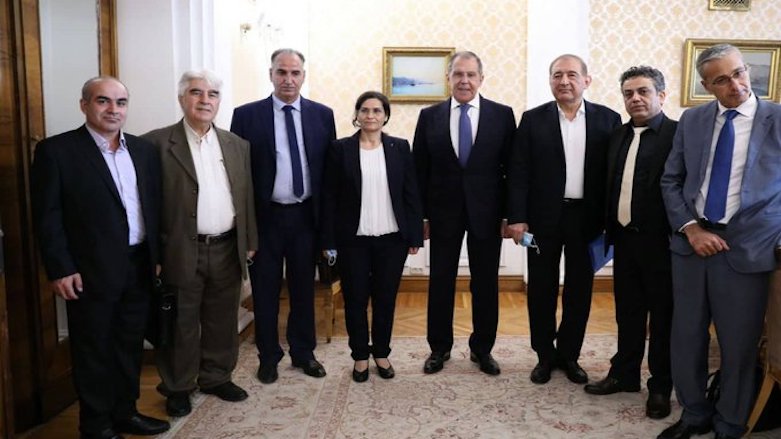Russia meets Syrian Kurdish-led delegation in Moscow, despite Turkish concerns
Russian Foreign Minister Sergey Lavrov confirmed that a meeting had taken place between a delegation of the Kurdish-led Syrian Democratic Council (SDC) and a pro-Moscow Syrian party.

ERBIL (Kurdistan 24) – On Monday, Russian Foreign Minister Sergey Lavrov confirmed that a meeting had taken place between a delegation of the Kurdish-led Syrian Democratic Council (SDC) and a pro-Moscow Syrian party, the “Popular Will Party” (PWP), and the two parties had signed a joint memorandum in an effort to include the Syrian Kurds in the political discussions on Syria’s future.
Read More: Top SDC delegation visits Russia for meetings: official
Moscow, for its part, is prepared to aid in the effort. Russian Foreign Minister Sergey Lavrov met with the two parties and “reaffirmed Russia’s readiness to continue to aid the promotion of an inclusive constructive inter-Syrian dialogue in the interest of the speediest recovery and reinforcement of Syria’s sovereignty, unity and territorial integrity; the formation of conditions for harmonious co-existence; and development of all ethnic and religious parts of the Syrian society," the Russian Foreign Ministry said in a statement.
The joint SDC-PWP memorandum emphasized that the Syrian Democratic Forces (SDF) had played an important role in the war against terrorism and stated that the SDF should be integrated into the Syrian army. However, it also stressed that the Syrian army should not interfere with politics, while it held up the Autonomous Administration of North and East Syria (AANES) as an example for the rest of Syria.
#Syrian_Democratic_Council #SDC #MSD#Syria
— Syrian Democratic Council SDC (@SDCPress) August 31, 2020
Memorandum of Understanding Between the Syrian Democratic Council and the Popular Will Party.@ElhamAhmadSDC @kadrijamil
Link : https://t.co/nvora4yr9j pic.twitter.com/1QyC5yCbva
So far, talks between Damascus and the SDF have failed, despite Russian meditation. In earlier talks, which also failed, Syrian Kurdish leaders called for some degree of autonomy, as well as recognition of the SDF, but Damascus insisted on the full return of all territory within Syria’s borders to the central government.
Recently, tensions between the SDF and the regime have increased following reports that an oil deal had been signed between Kurdish-led forces in Syria and a US company.
Russia, Turkey, and Iran all condemned the oil deal in a joint statement on Aug. 25, in which they also underscored their commitment to the “territorial integrity of Syria.”
The SDC visit to Moscow coincided with that of a Turkish delegation, headed by Deputy Foreign Minister Ambassador Sedat Önal.
The Turkish Foreign Ministry responded to the news, by saying that its delegation in Moscow would deliver Turkey’s negative reaction toward the SDC visit to Russia.
Yet although Turkey said it was highly concerned by the SDC’s visit to Moscow, it did not go as far to condemn the visit.
Press Release Regarding the Visit of a Group Belonging to the PKK/YPG-Dominated So-called “Syrian Democratic Council” to the Russian Federation https://t.co/XT3FLTC4sk
— Turkish MFA (@MFATurkey) August 31, 2020
“The Astana guarantors reaffirmed, most recently at their meeting in Geneva on August 25, 2020, their shared objection to separatist agendas of illegitimate entities,” the Turkish Foreign Ministry said.
Anton Mardasov, a non-resident scholar in the Middle East Institute's Syria Program, advised Kurdistan 24 that the “Turkish reaction is understandable, but it is also clear that the Turks themselves, in one way or another, in particular MIT (Turkish intelligence service), are negotiating with the Kurds.”
“It is clear that Ankara fears the introduction of the Kurds into the negotiating process, but Moscow is trying to balance competing demands and present the situation, as if it is forced to take into account the wishes of other regional players,” Mardasov continued. “But honestly, I don't think it's a good game.”
Last week, the Syrian regime and the Turkish-backed Syrian opposition held a week-long discussion in Geneva that ended with an agreement to resume talks in the future. However, the SDC was not invited to those talks, because of Turkish opposition.
Qadri Jamil was Deputy Prime Minister for Economic Affairs, until his abrupt dismissal by the Syrian regime in late 2013. He heads the PWP. The SDC’s understanding with the pro-Moscow opposition PWP might well be an attempt to gain support for including the SDC in the Geneva talks, the Russian analyst suggested.
In January 2016, Moscow also attempted to include the SDC in the Geneva talks as part of a third delegation, a pro-Moscow group of independent figures. However, at the time, Turkey opposed the effort and suggested instead that the SDC should join the regime delegation, rather than the Syrian opposition delegation.
“Moscow is obviously making attempts to involve the Kurds in the talks” on Syria’s future, Mardasov concluded.
Editing by Laurie Mylroie
